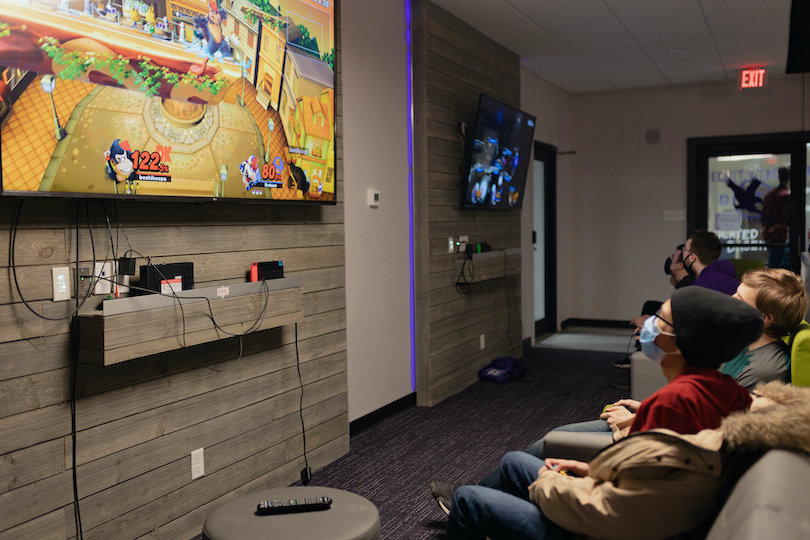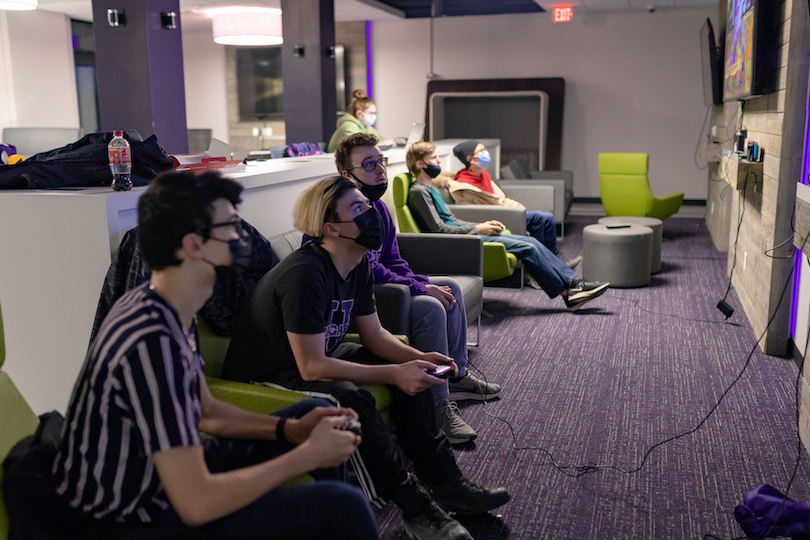Featured News - Current News - Archived News - News Categories
Editor’s note: In July, 11 Niagara Falls High School students participated in a special esports camp offered at Niagara University.
By Dr. Karen Kwandrans
Executive Director, Levesque Institute
The Levesque Institute at Niagara University, in partnership with the Niagara Falls City School District, offers an esports program designed to present new and innovative learning experiences to students. The NU summer camp and school year activities prepare high school students for the post-secondary options available in this area. The series is offered to 11th and 12th grade high school students to expand their knowledge and understanding of esports and identify future educational and career possibilities.
Students participated in a three-week summer camp in July where they attended two college classes, experienced the world of gaming in the NU Esports lounge, visited the M&T Tech Hub, explored the metaverse in the NU Oculus Lab, and heard from esports and IT professionals, as well as tech start-up business owners. Successful completion of Python I/programming languages and a digital media course meant students also earned six college credits.
Following the summer component, students who continue to participate in the esports program will have the opportunity, throughout the school year, to take two additional college courses – intro to marketing and CIS mobile game design – and also will visit the NU campus to continue to engage with NU students, faculty and professional speakers.
The NU Esports program provides an excellent opportunity for students seeking to learn more about career pathways, including the education and essential job readiness competencies needed to enter the expansive esports job market.
The program engages learners to develop the skills needed for agile learning environments in the multidisciplinary field of esports.
••••••••

Niagara University Esports members play titles inside "The Nest" in O'Shea Hall. (Niagara University photo)
By L. Anthony Townsend and Ethan Smith
Niagara Falls High School/Niagara University Esports Camp Participants
While most kids spend their summers playing games and sleeping in, 11 students from Niagara Falls High School signed up for a three-week course at Niagara University for an opportunity to earn six college credits. The Niagara Esports Camp was an interactive learning experience comprised of two classes: CMS 120EC and CIS programming.
The program began on July 11, and the educators for these classes were professor Joshua Maloni, who taught CMS 120EC; and Dr. Yonghong Tong, who taught CIS programming. The courses included guest speakers, on-campus tours and field trips. The guest speakers included members of the Niagara Esports club; speakers from ZIZO; and Peter LePore, partner and chief learning architect at Scarole Enterprises. The NU esports program also provided information on job opportunities in the fields of journalism and programming through guest speakers and field trips.
The CMS 120EC class was taught by Maloni and, like the programming class, lasted three weeks. Students learned to write press releases, feature articles, and proper interviewing strategies. During this class, students had many opportunities to learn these skills through the work assigned and the lectures.
One assignment that really stood out was the second assignment in which the students were given the opportunity to interview guest speakers Alyssa Chorazak, president of the esports club; and Bill Newton, assistant director of campus activities at NU. The class concluded with a final assignment that gave students a higher degree of freedom with their article, and an opportunity to have their work published for more people to see.
Despite the class’s limited time, professor Maloni said that there was enough time to cover everything on the syllabus – although the class could have benefited from a few more days.
Overall, the class left a great impression on the students. When asked about this class and their experience with it, the students had nothing to say but positives. Student Ahnaf Tanim said, “I learned that writing is just like cooking, because it must be timely and appealing.”
The CIS programming class, taught by Dr. Tong, covered the basics of the programming language Python. Throughout the course, students learned how to use Python in Replit, and the basics of using functions with variables to write complex code. In this class, students also had an opportunity to go to M&T Bank in Buffalo to observe the facilities and positions in the growing tech world.
The final assignment in the class was to create a game with the information provided throughout the class. For this final assignment, students were allowed to work in groups, allowing for a collaborative experience. They were given a couple days to complete it.
While the class was very informative, the limited time effected the course. When asked what could be improved with the class, Dr. Tong said that, while the class was good, more time could have helped. Time aside, the students were able to complete the assignments on time.
When asked about the experience teaching the class, Dr. Tong said, “I can see that these young adults work great, because all of you have different backgrounds. They were very good and very engaged students.”
While the course is over now, there will be an opportunity to continue in the fall and spring with more in-depth lessons on game design.
After the students’ class time was complete, they would have the opportunity to go to the campus dining hall and then participate in campus activities. These activities included campus tours, visits to the campus esports club in O’Shea Hall, and lectures that provided information on job opportunities.
One of these lectures was from LePore, who talked to the students about the growing esports industry, job opportunities and his job as chief architect. This was one of the many activities the students were able to partake in on campus.
Along with these activities, students also got to take on a higher degree of freedom and responsibility with these courses, better preparing them for college life.
Overall, the esports camp was a great experience for everyone involved, with students learning skills in journalism and programming. When interviewed, students had nothing negative to say; and when asked if they would take the program again, most students said yes.
Asa Gates said, “I think that the Niagara Esports club was a great experience, and I would love to continue this in the fall.”
•••••••••
Niagara University Associate Director of Campus Activities Bill Newton and Niagara University Esports President Alyssa Chorazak at a camp press conference.
By Cameron Madigan
Niagara Falls High School/Niagara University Esports Camp Participant
The Niagara Esports club at Niagara University is one of the most popular student organizations in the school. With over 50 members and counting, the club has grown a great amount since its introduction in fall of 2018. What started as an idea from a transfer student from RIT soon became a place for casual and competitive gamers alike to play video games and come together as a community.
Niagara Esports is a club that plays casually and competitively in a variety of video games. Its competitive teams play games such as League of Legends, which is a strategy game; Overwatch, which is a shooter game; Rocket League, which is a soccer game where the players are cars; and Super Smash Bros, a game where players fight to knock other players off the stage. The esports club has multiple teams, with some just playing for fun with friends, and others playing in face-to-face competition in large events.
Niagara Esports originally started because of transfer student Bryce Molnar, who was surprised at the fact Niagara University didn’t seem to have an esports club of its own. So, he went to Bill Newton, the associate director of campus activities. Newton, after having esports explained to him, took Molnar’s concept to the student government, which approved the club to start.
Originally, the club started with around eight people, who would go on to compete in an event in Albany in the spring of 2019. Soon after the event, the club worked with university administration to establish its own dedicated and renovated space, now known as “The Nest,” in O’Shea Hall.
Since the start of the program, the club has continued to grow, as more members joined. By January of 2020, the club had gained enough new members to get an area specifically for PC and console gaming in its space. With the influx of new members, the club was split up into different teams, with some playing against each other, and others playing against other schools, with the competitive teams having tryouts for people who wanted to join.
The esports club has gained attention from outside of the university’s campus, as well, with high school students attracted to NU because of the esports program.
“To me as president … it means a lot,” said Alyssa Chorazak, the current president of the esports club. “It means, as a community, people want to come to our school.”
Chorazak originally came to Niagara University during the year 2020. She had trouble meeting others because of COVID-19 guidelines that were in place. However, because of the community of people in the esports club, she was able to make friends and meet new people.
This is true for most members of the esports program.
Currently, Niagara Esports’ main goal is to get 100 students to join the club, which is certainly attainable at the rate it’s growing. This is made possible from high schoolers coming to Niagara University because of its esports program.
“We want esports to be at the forefront,” Newton said. “We want esports to be what they see.”
All students need in order to join the club is to pay club dues, which are $10 to $20 per semester.
More information can be found at www.niagara.edu/esports.

Niagara University Esports members play titles inside “The Nest” in O’Shea Hall. (NU photos)





























